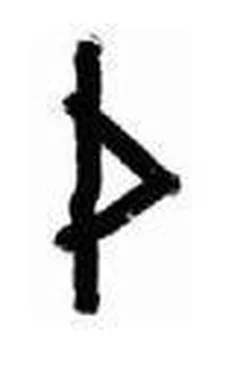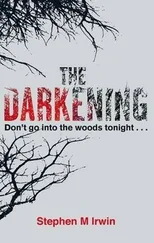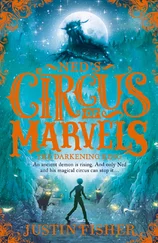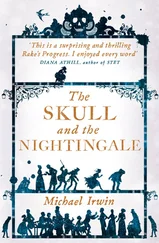Stephen Irwin - The Darkening
Здесь есть возможность читать онлайн «Stephen Irwin - The Darkening» весь текст электронной книги совершенно бесплатно (целиком полную версию без сокращений). В некоторых случаях можно слушать аудио, скачать через торрент в формате fb2 и присутствует краткое содержание. Жанр: Триллер, на английском языке. Описание произведения, (предисловие) а так же отзывы посетителей доступны на портале библиотеки ЛибКат.
- Название:The Darkening
- Автор:
- Жанр:
- Год:неизвестен
- ISBN:нет данных
- Рейтинг книги:5 / 5. Голосов: 1
-
Избранное:Добавить в избранное
- Отзывы:
-
Ваша оценка:
- 100
- 1
- 2
- 3
- 4
- 5
The Darkening: краткое содержание, описание и аннотация
Предлагаем к чтению аннотацию, описание, краткое содержание или предисловие (зависит от того, что написал сам автор книги «The Darkening»). Если вы не нашли необходимую информацию о книге — напишите в комментариях, мы постараемся отыскать её.
The Darkening — читать онлайн бесплатно полную книгу (весь текст) целиком
Ниже представлен текст книги, разбитый по страницам. Система сохранения места последней прочитанной страницы, позволяет с удобством читать онлайн бесплатно книгу «The Darkening», без необходимости каждый раз заново искать на чём Вы остановились. Поставьте закладку, и сможете в любой момент перейти на страницу, на которой закончили чтение.
Интервал:
Закладка:
His eyes were adjusting to the gloom. He craned his head back.
Between the trusses overhead were strung side by side two old wood painter’s planks, each thick as his wrist and grey with age, spattered with a muted rainbow of paints that had dried before Nixon resigned. Stacked on the planks were his father’s suitcases.
Leaning against the rear wall was a timber stepladder, also speckled with paint. Loops of gritty cobweb hung between the treads like hammocks in a sunken ship. Nicholas drew in a deep breath — the effort set him shaking harder — and blew what dust he could off the ladder and pulled it from the wall. He set it below the planks, and climbed.
His head drew level with the first suitcase; inches from his face, a spider the size of a coaster hung from the plastic handle. He instinctively jumped back, and only stopped himself falling by grabbing the red hardwood truss. A splinter drove deep into the soft web of flesh between his finger and thumb. He steadied himself. The spider bobbed in the disturbed air, light as tissue. It was a carapace, hanging empty by a silk thread. Nicholas felt his heart fluttering like a trapped sparrow; he flicked the spider shell away and started carrying the suitcases down to the earth floor.
On the ground, they seemed smaller. Coated in dust and warped by seasons of damp and dry, they looked lost and vulnerable. Two were a matching herringbone, in beige and black; the third was once a cadaverous green.
He pulled that one towards him. Its plastic corners had cracked with age; its catches were brown and rusted. He pressed hard and something inside the lock snapped and the freed lid rose a fraction. He swung it open; the rusted hinges let out the sigh of a poorly sleeping man.
The clothes inside were so badly eaten by moth larvae that when he lifted what he guessed was a cardigan, it fell apart in his fingers. But his eyes lit on something untouched by the vermin: the synthetic label inside the collar. He read the cream rectangle: Size 38. A size smaller than mine, he thought. Before he knew what he was doing, he lifted the rotting fabric to his nostrils and inhaled. An unhappy blend of lanolin and wet soil. Nothing of the man. He dropped the rags.
Inside the upper lid was a sleeve for shoes; its elastic had long lost its pull and it sagged like a slack, dead mouth. Inside were some cardboard train tickets, each punched with a tiny hole, and a few bronze coins. Beneath the rotten chaff of eaten wool and grub pellets were some rusted tobacco tins. Nicholas pushed the case aside, and pulled another towards him.
It, too, resisted opening. He went to the workbench and found a screwdriver — its shaft grainy with rust — and popped open the stubborn latch. Within were books. These, too, had been exposed to insects, but clearly were less palatable fare and were only mildly damaged. They smelled potent: mealy and ripe. Nicholas lifted them out one by one. Some were cheap things, the spines of which lifted away the moment he touched them; others were weighty with dark, glossy covers. Books on spiritualism, clairvoyance, gods of the pagan world, Irish mythology — an even dozen. He pushed them aside and pulled the last suitcase towards him.
This was the smallest and heaviest. It opened without protest and Nicholas felt his stomach tighten. More books: herbs and magic. Druidism. Voodoo. The Apocrypha. Despite Suzette telling him the books were here, he was amazed to hold them in his hands. How could his mother, his pragmatic, no-nonsense mother, ever have cohabited with a man who read books like this? But of course, she didn’t. Not for long. Their marriage had lasted just four years.
Nicholas stacked the books to one side as he pulled them out. What was he looking for? Would he have to go through all these dreary volumes one at a time?
No. It’s here.
There were three books left. He lifted aside The Curse of Machu Picchu , and stopped. Beneath was a book unlike all the others. It was a slight staple-bound thing with a thick paper cover in jaundice yellow; in the centre of the cover was an etching of the Tallong State School main building. The title read: Tallong S.H.S — 75 Years — 1889–1964 .
Nicholas felt the pulse in his neck beat stronger. He flipped open the book.
The contents were broken into three chapters: the first twenty-five years, then 1914 to 1939, 1940 to 1964. Within the chapters were sprinkled black and white photographs of principals, of buildings being erected, of a governor’s visit, and, of course, year photos of students, seated in four rows of eight or so, their teachers smiling cheerfully or wearily or dutifully from their midst.
Was his father’s photo in here? Nicholas flipped through to the end of the book. As he did, a page slipped out and slid like a feather to the dark earth. He picked it up. No, not a page. It was a newspaper clipping, yellow and crisp: a truncated advertisement for Hotpoint clothes dryers. He turned the clipping over. As he read the headline of the small article, he felt his face go cold.
‘Boy Missing — Police Seek Information’.
It took half a minute to read the article. A twelve-year-old boy named Owen Liddy had left his Pelion Street home on a Saturday morning; he was to catch a train into Central Station and visit a model aeroplane exhibition at the City Hall. His mother became worried when he hadn’t returned by four. People attending the exhibition were interviewed; none recalled seeing a boy fitting Liddy’s description. Police were inviting any information from the public.
Nicholas re-read the article. Then he noticed the last page of the Tallong schoolbook was dog-eared. He picked it up and opened to the marked page.
It showed a photograph of the 1964 year seven students. A grinning girl in pigtails held a pinboard with the class name: 7C. But it was the face of a short, smiling boy third along in the second to back row that Nicholas stared at. The face was circled in dark lead pencil. He slid his eyes down to read the caption below the photograph: ‘Left to right: Peter Krause, Rebecca Lowell, Owen Liddy. .’
Nicholas stared at the clipping for a long moment. What did it mean? Had his father known the boy? Unlikely — Donald Close would have been in his late teens in 1964. A friend’s brother? Possibly. Had the boy turned up safe and well? Nicholas thought it unlikely; besides, why would his father have kept the clipping? There was only one answer.
Dad knew .
A boy went missing, and Donald Close thought it was odd enough a disappearance that he kept the article. Kept it for nearly ten years, until he himself had disappeared from his family’s life and broken himself in two when his sliding car was sliced open by a poorly marked concrete road divider. But he left it , thought Nicholas. He left it with his books.
He left it for us.
He folded the clipping and slipped it into his pocket. Outside, the morning had gone grey and the air in the garage was cold.
He hurriedly put the suitcases back on the overhead planks, eager to be out of this room that was as uncomfortably quiet as a grave.
Nicholas let himself back in the house. The hall was quiet, and the air was freezing.
‘Suzette?’
He rapped on her bedroom door, opened it. Her bed was made, her suitcase open on a chair under the window. From underneath the house came a low thrumming. His mother’s pottery wheel: the electric hum of industry.
Halfway back down the hall, the walls took on a heavy tilt and Nicholas lurched. As he steadied himself, two large drops of sweat fell on the timber floor. He was feverish.
He fetched a change of clothes and went to the bathroom. In the bottom drawer of the vanity he found a half-empty box of Disprin and popped four in his mouth and felt them fizz on his tongue. Then he stripped off and turned on the shower.
Читать дальшеИнтервал:
Закладка:
Похожие книги на «The Darkening»
Представляем Вашему вниманию похожие книги на «The Darkening» списком для выбора. Мы отобрали схожую по названию и смыслу литературу в надежде предоставить читателям больше вариантов отыскать новые, интересные, ещё непрочитанные произведения.
Обсуждение, отзывы о книге «The Darkening» и просто собственные мнения читателей. Оставьте ваши комментарии, напишите, что Вы думаете о произведении, его смысле или главных героях. Укажите что конкретно понравилось, а что нет, и почему Вы так считаете.











